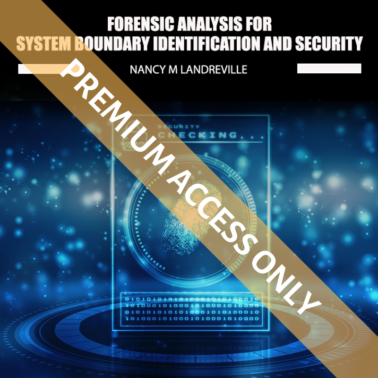No products in the cart.
- You cannot add "The Ultimate CISSP Study Guide" to the cart because the product is out of stock.
Open Source Intelligence for Forensics (W41)
$149.00
Courses Included
Only 2 left in stock
Get the access to all our courses via Subscription
Subscribe
Product Description
Open source intelligence is an important subject in today’s world. Whether you need to investigate a person, a business, or find any other facts, you need to know basic and more advanced ways of finding this information in the most effective and efficient ways possible. Reasons for searching could be anything, you may be researching your family tree, searching for friends for fun, or it could be something more serious, like doing it as a profession. The techniques being used are constantly changing, so it is crucial you understand the most up-to-date methods right now so that you can keep up with the changes as they happen. This course will teach you these up-to-date methods and will help you keep your skills sharp as time goes on.
COURSE BENEFITS
What will you learn about?
- During this course, you will first learn how to set up a good environment for carrying out internet investigations. Once set up, you will learn how to locate specific social media profiles for who you are searching for using identifiers like names, emails, phone numbers, and more.
- You will then learn how to gather as much information as possible from these accounts, whether they look empty, are set to private, or have public information.
- The course will then go into official public records where information can be found regardless of whether your target has a social media presence or not.
- You will learn about what software and browser extensions are available to assist in your investigations. These range from helping with maps, images, and details about websites you visit.
What skills will you gain?
- You will learn how to use search engines in a much more advanced way than general every-day searching. This can help for both investigations and normal searching.
- You will find out about resources that you can use to find information and how to use popular applications like Facebook and YouTube to find more advanced information that you may not know exists.
- You will see the kinds of specific public records there are in different countries like the UK and US.
- Most people will be shocked with what you can find about them after this course.
What tools will you use?
- Google Chrome
- Notepad++
- Lampyre
- Sift
COURSE PREREQUISITES
COURSE IS SELF-PACED, AVAILABLE ON DEMAND
DURATION: 18 hours
CPE POINTS: On completion you get a certificate granting you 18 CPE points.
Course format:
- Self-paced
- Pre-recorded
- Accessible even after you finish the course
- No preset deadlines
- Materials are video, labs, and text
- All videos captioned
What should you know before you join?
- This course doesn’t involve programming or a lot of knowledge or experience, however, it would be preferred that you have basic knowledge about using your computer or laptop as well as using a web browser or downloading software.
- Very basic knowledge about social media, like creating accounts, for example.
What will you need?
- Windows is preferred, due to some of the software
- Web Browser (Google Chrome)
- Text Editor (Notepad++)
- Social Media Accounts (Facebook, Instagram, Snapchat, Twitter, Skype)
- Lampyre
- Sift
Your instructor: Joshua Richards
 Joshua Richards is a student at University of South Wales studying Cyber Security and Forensics. He works closely with a non-profit organisation called Trace Labs and is an administrator in the Word Class Investigator Slack community. His interests involve open source intelligence, forensics, and solving problems like riddles and puzzles. He enjoys meeting new people and helping to develop their skills.
Joshua Richards is a student at University of South Wales studying Cyber Security and Forensics. He works closely with a non-profit organisation called Trace Labs and is an administrator in the Word Class Investigator Slack community. His interests involve open source intelligence, forensics, and solving problems like riddles and puzzles. He enjoys meeting new people and helping to develop their skills.
COURSE SYLLABUS
Module 0
Setting up the web browser and creating a report template.
Module 1 - Using Identifiers
It is important to understand different identifiers and what new information they can provide you with. Some identifiers are unique, like emails. However, some aren’t unique, like people’s names could be the same. Using these small bits of information, we can gather social media accounts, family members, personal information, phone numbers, phone make and model, and more. OSINT is about using whatever you have and trying to expand that to new information, so it is important you know techniques to do this.
Covered topics: Identifiers
- Names
- Phone Numbers
- Emails
- Usernames
- Domains
In this module, you will learn how to search these identifiers to find social media accounts, personal information, and other identifiers. This is done using WHOIS records, public data breaches, importing contacts to websites, forgotten password pages, advanced Google searches, website archives, and more.
Assignments:
- You will be given a fake report containing some basic information. You will have to determine which bits of information are unique and which aren’t.
- You will be given an email address and will then have to discover the owner’s home address from it.
- You will be given an email address along with the name of a data breach. You must find the entry to retrieve the hash value of their password.
- You will be given a domain name, and you will have to retrieve a piece of information that was on the website on a specific date.
Workload: 4.5 hours
Module 2 - Social Media (Online Profiles)
Social media is a very big part of the internet now and usually people will have at least one social media profile out there somewhere. This makes it essential to know when conducting OSINT investigations. When you have found an account from searching any identifiers you have, you must know how to gather as much information as you can from their profile. Although some accounts may seem blank or deleted, there can be a lot of information hidden behind the scenes that you just need to know how to find using special techniques.
Covered topics: Platforms
- Snapchat
- YouTube
- Skype
- GitHub
- Steam
- Others
In this module, you will learn methods to use on a range of social media platforms. The aim being to extract as much information as possible from these profiles by using the platforms’ search functions, advanced search functions, forgot password pages, basic API queries, and a variety of unique tips and tricks depending on the platform. You will learn about some of the less popular social media platforms that you must search on the site because Google doesn’t always index them. We will also head into some other websites that may not be considered social media but are popular sites that millions of people have profiles on, like Steam for gaming.
Assignments:
- You will be given a link to a Twitter profile that has a lot of tweets and you will have to get the contents of their very first tweet.
- You will be given a screenshot of a forum post which provides a Skype ID, you will have to give what your top five guesses would be when trying to work out their email address.
- You will be given a link to an Instagram account and will get a partial username of someone they are following. You will have to find the full username within their large following list.
- You will be given a link to a Facebook account and will have to get the unique ID of the account.
Workload: 4.5 hours
Module 3: Public Records
When gathering information about a person or business, lots of information is found through social media. So, when someone doesn’t have social media, you need to know the other methods out there to gather information about them. Public records will depend on what country the person is on who you are looking into, but in America they have lots, like property records, court records, prison records, voters’ databases, and more. In Britain, we have public birth records, marriage records, some property records, and more. This is an interesting topic because lots of public record data will involve data the person doesn’t know is out there, so won’t have tried to remove or hide and it can all be viewed regardless of whether they have any social media or not.
Covered topics: Countries
- Global Records
- UK Records
- US Records
- Other
In this module, you will learn about what information can be retrieved from public records all over the world. This is useful because it doesn’t matter if your target doesn’t have social media and doesn’t use the internet much, their information will be in the public record somewhere. Whether this be birth records, marriage records, death records, property records, or court records, your target will be in these somewhere. Even if your target isn’t a person, there are company records, aviation records, boat records, sanctions, and more. All countries have different public records, you just need to know where to look for them, which is what you will learn in this module.
Assignments:
- You will be given a plane registration and must then find the serial number of the plane.
- You will be given a name and birth year of someone in the UK and must then find their mother’s maiden name.
- You will be given a name of someone in the US and you must find their spouse and the date they got married.
- You will be given a VIN number for a car in the US and you must find the name of who previously bought the car.
Workload: 4.5 hours
Module 4: Tools & Extensions
There are lots of websites online that can be used to find information. Sometimes this can all be made easier by using software or browser extensions. Everyone will have their own process for an investigation, some will heavily use software tools throughout, and some may prefer a more manual approach. Whichever it is for you, it is important to know what is out there and the capabilities these tools have. There are even some small extensions that don’t do much but can help speed up certain techniques saving you a lot of time. This topic is useful and interesting because sometimes software will be able to accomplish things you cannot do manually.
Tool Types:
- Maps
- Image Searching
- Website Archiving
- Website Details
- Investigative Software
- Profile Data Gathering
In this module, you will learn about the software and extensions that are available to help with your investigations. These range from downloadable software, like Lampyre that allow you to visualise information and expand on it using their API queries and sources, to others include browser extensions that save you a lot of time like by performing a reverse image search with two clicks rather than having to go to each search engine and doing it manually. The same goes for finding an archived version of a deleted webpage quickly.
Assignments:
- You will be given an image of a building and must find out the name and location of the building.
- You will be given a URL to a website and must find the date it was first captured on the Wayback Machine.
- You will be given a Google Maps URL that leads to a building using coordinates and you must use Map Switcher to take it to Wikimapia and find exactly what it says under the Architect part to find who built it.
Workload: 4.5 hours
Final exam:
You will be given a range of images, and will have to locate where each image is. You will be asked for details about the locations and buildings shown in the images like who built them, details about these people, and more. A range of techniques will have to be used throughout to answer the questions.
 |
Contact:
If you have any questions, please contact us at [email protected].
5 reviews for Open Source Intelligence for Forensics (W41)
Only logged in customers who have purchased this product may leave a review.





Morgan Weetman –
This course was great, it didn’t just provide a set of links, but explained how to take a piece of information and leverage it to obtain further information a piece at a time, thanks Josh.
Chris –
This course provides many good solutions to a person who wants to learn OSINT skills, including personal social network, family tree and registration information. It helps people know more about how to get further information. I will give 4.5/5 for this course.
Eric (verified owner) –
EXCELLENT INTRODUCTION INROAD INTO THE OSINT PROFESSION
As a former military intelligence officer, the “Open Source Intelligence for Forensics Course” was my first formal course in OSINT, and it was a great way for me to begin my foray into the discipline. As a result of this course, I was able to learn multiple OSINT methods and document a large array of OSINT sources – all of which were instrumental in helping me obtain and maintain a new career. I was immediately able to use my newly-learned OSINT capabilities to significantly enhance the business intelligence capability of my new employer and to provide valuable intelligence to our customers.
jswauger (verified owner) –
GREAT OSINT INTRODUCTION
Well designed curriculum with pertinent practical exercises. The instructor has broken the material down into easily manageable modules with clearly defined objectives.
Jeff (verified owner) –
OSINT FOR FORENSICS
Having done OSINT investigations I was curious to take this course to see what methodologies and tools that were used here.
While I don’t always agree with certain parts of the course (using a proxy site instead of a secure VPN or a Windows host machine instead of a Linux VM) I can’t say that any of these were wrong either, it’s just another way of doing things.
Overall I would say it’s a good course for people that are new to OSINT and a very valuable tool to learn an understand.
Also the exercise at the end of the course was a nice touch, all in all well done.